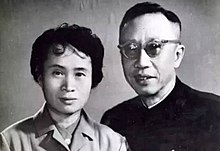Li Shuxian
| Li Shuxian | |
|---|---|
 | |
| Born | 4 September 1924 Republic of China |
| Died | 9 June 1997 (aged 72) People's Republic of China |
| Spouse | |
Li Shuxian (Chinese: 李淑賢; pinyin: Lĭ Shūxían; Wade–Giles: Li Shu-Hsien, 4 September 1924 – 9 June 1997), was the fifth and last wife of Puyi, the last emperor of the Qing dynasty in China.[1]
Biography
Li was ethnic Han Chinese and orphaned by the age of 14. After three years in foster care, her foster mother attempted to enter her into concubinage with a wealthy man. Li refused, and ran away to Beijing to become a hospital worker.[2] In 1959, after ten years in prison, Puyi was pardoned. The pair were introduced to one another by a friend in 1962 and wed that same year.[1] Premier Zhou Enlai greeted their marriage. It was Li's third marriage, and Puyi's fifth.[3] They had no children. She accompanied Puyi to his last days.[4]: 8
After her husband's death, Li retired from public view. She was not a regular hospital employee, but supplemented her income with a special stipend from the government that gave her a degree of financial stability.[5]

In the early eighties, she sought and received legal ownership of royalties from Puyi's autobiography from the government of China.[6]
Under the approval of the government, she moved Puyi's ashes closer to his ancestors in the Western Qing Tombs (清西陵) from the Babaoshan Revolutionary Cemetery. She died of lung cancer at the age of 72. It had been Puyi's desire to be buried alongside Li as well as his first concubine Tan Yuling (潭玉齡). Li was firmly against this arrangement, stating that she had given Puyi enough of her time and energy in life.[3]
Li's memoirs were published posthumously under the title Modai Huangdi Puyi yu wo (末代皇帝溥仪与我; 'Last Emperor Puyi and I'). The author, Wang Qingxiang (王慶祥), compiled oral interviews with Li Shuxian along with those of others close to Puyi in his later years to narrate their marriage and family life. Li is sometimes credited as a coauthor of the book.[7]
References
- ^ a b Li Yuqin (July 1986). "My Life in the Imperial Palace". Chinese Studies in History. 19 (4). Taylor Francis: 82–101. doi:10.2753/CSH0009-4633190482. ISSN 0009-4633.
- ^ Li Xin (8 April 1995). "Pu Yi's Widow Reveals Last Emperor's Soft Side". Inter-Press Service Harare.
- ^ a b 溥儀一生5妻說:最愛李淑賢 但她臨死也堅決不和溥儀合葬 [The story of Puyi's five wives: Li Shuxian was most belovèd, yet until her death steadfastly refused to share his tomb]. Sanli News (in Chinese). 2020.
- ^ Corfield, Justin (2014). "Aisin Ghiorroh Pu Yi (1906–1967)". In Song Yuwu (ed.). Biographical Dictionary of the People's Republic of China. McFarland. pp. 7–8. ISBN 978-1-4766-0298-1.
- ^ 溥仪61岁去世 给妻留什么遗产让李淑贤衣食无忧 [Puyi died at age 61; what resources were provided to his widow Li Shuxian to meet her basic needs?]. Wangyi (in Chinese). 5 September 2021.
- ^ Guo Xiaoming (郭晓明) (10 October 2007). 无子女遗嘱 末代皇帝溥仪自传被公告为无主财产 [With no children and no will, Last Emperor Puyi's autobiography undergoes public notice to become ownerless property]. Chinanews.com (in Chinese).
- ^ Wang Qingxiang (王慶祥) (2007). Modai Huangdi Puyi yu wo 末代皇帝溥仪与我 [Last Emperor Puyi and I]. Jinghua Press. ISBN 9787807243946.
